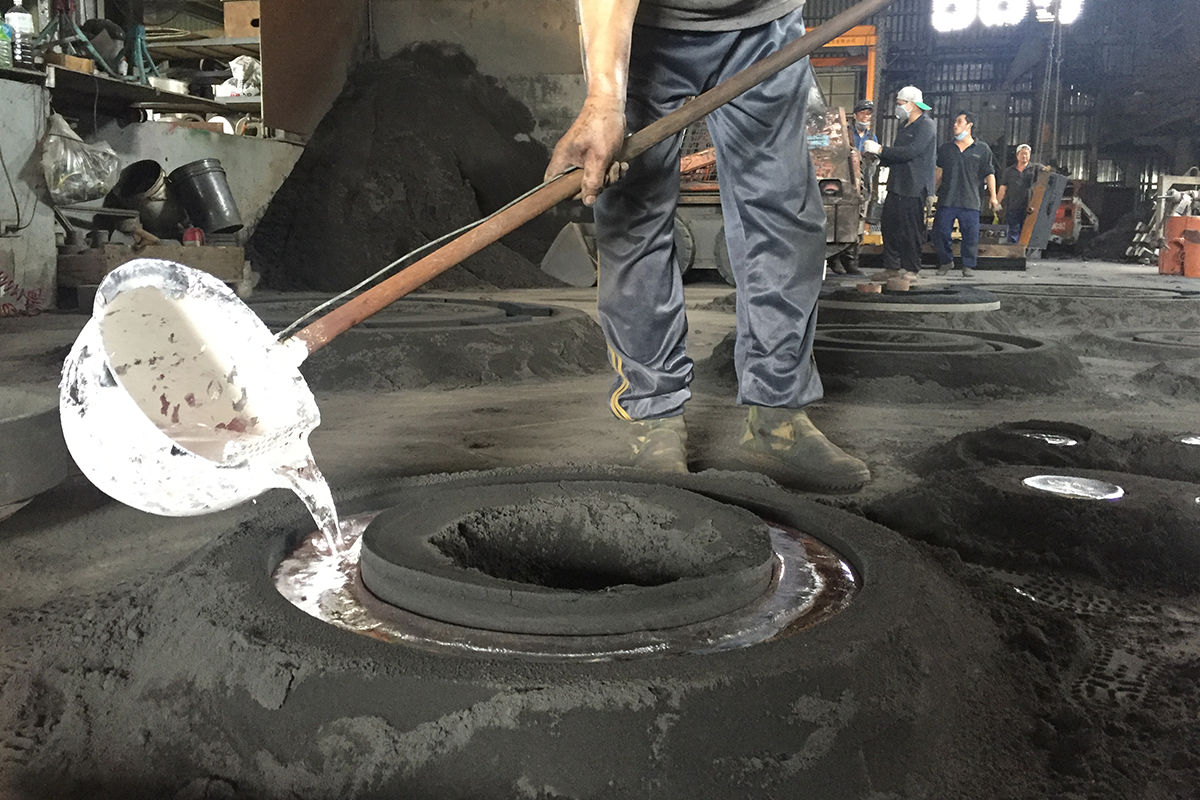Understanding the Perks and Innovations in the Aluminum Foundry Sector
The Aluminum Foundry sector plays an important function in modern production. Its light-weight buildings notably enhance fuel effectiveness, particularly in aerospace and vehicle markets. Furthermore, Aluminum's resistance to deterioration guarantees longevity in various applications. As the industry evolves, developments such as advanced recycling and additive manufacturing are reshaping production methods. Exploring these developments reveals not only the benefits but also the challenges ahead for Aluminum foundries in a rapidly changing market.
The Lightweight Benefit of Aluminum
Aluminum's light-weight nature uses considerable benefits across different markets, particularly in manufacturing and transport. Its reduced density allows for the production of components that are much easier to install and take care of, causing lowered labor expenses and enhanced efficiency. In the auto market, lighter cars add to boosted gas economic climate and lower emissions, aligning with international sustainability goals. Similarly, in aerospace, using Aluminum minimizes the general weight of aircraft, which is crucial for enhancing performance and reducing functional expenses.
In addition, Aluminum's lightweight buildings promote innovative layouts that were previously unfeasible with much heavier materials. This flexibility makes it possible for makers to develop complicated shapes and frameworks while maintaining architectural integrity. Generally, the light-weight advantage of Aluminum not just enhances product efficiency yet likewise drives innovations in innovation and layout, making it a preferred material in numerous applications.
Corrosion Resistance and Toughness
The Aluminum Foundry industry is renowned for creating products with superior rust resistance, making them optimal for various applications. This residential or commercial property, integrated with boosted architectural integrity, contributes to the lasting performance benefits that Aluminum elements use. Because of this, sectors increasingly rely upon Aluminum to satisfy demanding ecological problems without jeopardizing top quality.
Superior Rust Resistance
While numerous steels encounter significant obstacles from environmental variables, Aluminum stands out for its superior rust resistance, making it a preferred choice in lots of applications. This building is primarily due to an all-natural oxide layer that develops on the Aluminum surface, offering a barrier versus dampness and corrosive agents. Unlike other metals that may corrosion or break down over time, Aluminum keeps its integrity also in severe environments, such as industrial setups or seaside areas. Furthermore, its lightweight nature combined with deterioration resistance makes it excellent for applications in aerospace, auto, and aquatic markets. In general, Aluminum's outstanding longevity not just improves product longevity yet additionally minimizes maintenance prices, providing a compelling benefit for customers and producers alike.
Boosted Structural Honesty
Engineers and designers significantly identify the value of enhanced architectural integrity in contemporary applications, where both corrosion resistance and longevity are important. Aluminum alloys, known for their light-weight residential or commercial properties, additionally exhibit exceptional resistance to corrosion, making them appropriate for rough atmospheres. The innovative strategies used in the Aluminum Foundry industry add substantially to creating parts with improved longevity. Advanced casting procedures and alloy compositions are tailored to satisfy specific performance demands, ensuring that structures can hold up against extreme conditions without jeopardizing honesty. Surface treatments and layers enhance the life-span of Aluminum items, better alleviating deterioration over time. This concentrate on enhanced architectural honesty not only prolongs the use of products but likewise decreases maintenance expenses, strengthening Aluminum's setting as a material of choice in various industries.
Durable Efficiency Advantages
Lasting performance in Aluminum components is mostly associated to their exceptional corrosion resistance and sturdiness. Unlike many steels, Aluminum normally creates a protective oxide layer, which prevents corrosion and deterioration in numerous settings, including aquatic and commercial setups. This intrinsic residential or commercial property considerably extends the life-span of Aluminum items, reducing maintenance and replacement prices. Additionally, the light-weight nature of Aluminum enhances its applicability throughout markets without jeopardizing strength. The product's resistance to deterioration also contributes to its integrity popular applications, making it an excellent selection for auto, aerospace, and building sectors. As sectors progressively prioritize sustainability and durability, Aluminum's efficiency benefits align with modern-day engineering requirements, solidifying its duty in innovative production procedures.
Environmental Influence and Sustainability
 As the Aluminum Foundry market evolves, it progressively prioritizes ecological effect and sustainability, identifying the need for liable practices when faced with environment adjustment. Efforts to reduce waste and power intake are at the leading edge, with many factories adopting recycling initiatives to recover Aluminum scrap. This not just lowers basic material usage however likewise especially reduces power expenditure, as recycled Aluminum requires only a fraction of the energy compared to main manufacturing.
As the Aluminum Foundry market evolves, it progressively prioritizes ecological effect and sustainability, identifying the need for liable practices when faced with environment adjustment. Efforts to reduce waste and power intake are at the leading edge, with many factories adopting recycling initiatives to recover Aluminum scrap. This not just lowers basic material usage however likewise especially reduces power expenditure, as recycled Aluminum requires only a fraction of the energy compared to main manufacturing.Moreover, improvements in exhausts regulate technologies are being carried out to decrease air contaminants, straightening operations with more stringent environmental guidelines. Factories browse this site are likewise checking out alternative energy resources, such as solar and wind, to power their facilities sustainably. By promoting collaboration with stakeholders, the market intends to create ingenious options that boost environmental stewardship. Collectively, these initiatives highlight a commitment to minimizing the Aluminum Foundry's carbon footprint while promoting a round economic climate within the production industry.
Advanced Manufacturing Techniques
 Revolutionizing production procedures, the Aluminum Foundry market is increasingly integrating sophisticated manufacturing techniques to improve efficiency and accuracy. Strategies such as computer mathematical control (CNC) machining and additive manufacturing have actually emerged as essential components in maximizing manufacturing workflows. CNC machining allows for high-precision part manufacture, significantly reducing material waste and production time. On the other hand, additive manufacturing opens up brand-new avenues for complex geometries and lightweight styles that were formerly challenging to attain.
Revolutionizing production procedures, the Aluminum Foundry market is increasingly integrating sophisticated manufacturing techniques to improve efficiency and accuracy. Strategies such as computer mathematical control (CNC) machining and additive manufacturing have actually emerged as essential components in maximizing manufacturing workflows. CNC machining allows for high-precision part manufacture, significantly reducing material waste and production time. On the other hand, additive manufacturing opens up brand-new avenues for complex geometries and lightweight styles that were formerly challenging to attain.In addition, the deployment of automation and robotics in Aluminum factories simplifies operations, reduces human error, and enhances employee safety and security. These innovations help with a more responsive manufacturing setting, enabling producers to adapt swiftly to market needs. The assimilation of advanced simulation software application additionally boosts the design and testing phases, leading to remarkable item top quality. Jointly, these techniques not only improve operational effectiveness however also foster technology, placing the Aluminum Foundry sector at the center of modern-day production.
Developments in Recycling Procedures
The Aluminum Foundry industry is not just progressing in producing techniques but is likewise making considerable strides in reusing procedures. Advancements are emerging to improve the efficiency of recycling techniques, decreasing energy intake and boosting sustainability. Advanced sorting technologies, such as automated optical sorting, enable the recognition and splitting up of Aluminum from other products with high accuracy. This results in a better of recycled Aluminum, which is crucial for keeping the honesty of the last products.
In addition, closed-loop recycling systems are being carried out, enabling suppliers to recycle Aluminum scrap within their very own production procedures. This minimizes waste and advertises a circular economy. In addition, research study into new recycling techniques, such as hydrometallurgical procedures, uses the possibility for recovering Aluminum from intricate waste streams. These developments not only add to decreasing the carbon impact of the Aluminum Foundry sector however additionally reinforce its financial practicality in a significantly environmentally mindful market.
Applications Throughout Various Industries
Many markets are significantly acknowledging the convenience and benefits of Aluminum Foundry items, bring about widespread applications across industries such as auto, building, aerospace, and customer items. In the automotive sector, Aluminum spreadings contribute to lightweight lorry designs, boosting gas performance and efficiency. Aerospace suppliers make use of Aluminum parts for their strength-to-weight proportion, important for aircraft frameworks and parts.
In construction, Aluminum is favored for its toughness and resistance to deterioration, making it excellent for home window structures, roofing, and architectural assistances. Durable goods additionally profit from Aluminum Foundry items, as seen in kitchenware, electronics, and packaging, where light-weight and recyclable materials are vital.
The adaptability of Aluminum Foundry techniques enables detailed layouts and precise specifications, satisfying the diverse needs of these industries. Consequently, Aluminum Foundry items are coming to be important to contemporary manufacturing procedures throughout various markets.
Future Trends in Aluminum Foundries
As sectors remain to develop, Aluminum foundries are poised to welcome a number of crucial patterns that guarantee to improve efficiency and sustainability. One prominent pattern is the enhancing adoption of digital technologies, consisting of automation and man-made knowledge, which simplify procedures and improve quality assurance. In addition, the press towards sustainable techniques is leading foundries to purchase recycling modern technologies, substantially decreasing waste and power usage.
 An additional arising fad is the usage of advanced alloys and materials, dealing with the growing demand for resilient and light-weight components across numerous industries (Aluminum Foundry). The combination of additive production strategies is prepared for to change part design, using customization and lowering lead times.
An additional arising fad is the usage of advanced alloys and materials, dealing with the growing demand for resilient and light-weight components across numerous industries (Aluminum Foundry). The combination of additive production strategies is prepared for to change part design, using customization and lowering lead times.Collaboration with research organizations is additionally anticipated to drive innovation, as foundries seek to develop new processes and materials. Aluminum Foundry. Jointly, these fads show a transformative future for helpful resources the Aluminum Foundry sector, aligning with broader objectives of sustainability and effectiveness
Regularly Asked Inquiries
What Are the Typical Costs Associated With Aluminum Foundry Production?
The common expenses connected with Aluminum Foundry manufacturing include basic materials, labor, energy, equipment maintenance, and overhead expenses. These factors jointly affect the general monetary investment required for efficient Aluminum spreading procedures.
Exactly How Does Aluminum Compare to Other Metals in Toughness?
Aluminum, while lighter than several steels, displays remarkable strength-to-weight proportions. Compared to steel, Aluminum is much less solid yet provides outstanding corrosion resistance, making it a positive option in applications where weight and durability are essential.
What Precaution Remain In Place in Aluminum Foundries?
Security measures in Aluminum shops normally include mandatory individual protective equipment, air flow systems to manage fumes, normal devices maintenance, training programs for employees, and adherence to stringent security guidelines to decrease threats connected with liquified metal handling.
How Is High Quality Control Managed in Aluminum Spreading Processes?
Quality control in Aluminum spreading procedures entails rigorous evaluations at numerous phases, consisting of basic material evaluation, procedure monitoring, and end product screening. Methods such as analytical process control and non-destructive screening guarantee adherence to market continue reading this criteria.
What Qualifications Are Necessary for Aluminum Foundry Suppliers?
The relevance of qualifications for Aluminum Foundry providers consists of ISO 9001 for quality monitoring, ISO 14001 for ecological management, and industry-specific requirements like ASTM and SAE, ensuring conformity, security, and integrity in manufacturing processes.
The Aluminum Foundry market plays an important duty in modern manufacturing. The Aluminum Foundry industry is renowned for creating products with premium corrosion resistance, making them suitable for numerous applications. Revolutionizing production processes, the Aluminum Foundry industry is progressively integrating sophisticated production techniques to enhance effectiveness and precision. The Aluminum Foundry industry is not only advancing in producing methods however is additionally making significant strides in recycling procedures. As sectors continue to advance, Aluminum foundries are poised to embrace numerous key patterns that assure to enhance performance and sustainability.